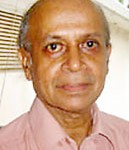By Arul K. Selvaratnam -
At a time when our universities badly lack qualified staff and are
trying to rebuild themzelves, a Selection Committee meeting on Jan. 30
2014 found Prof.
S. Ratnajeevan H. Hoole
unqualified for the post of Professor of Computer Science on all the
measures specified by the UGC’s Circular 916. So says the report of the
Selection Committee consisting of Prof. V. Arasaratnam (VC), Prof. S.
Srisatkunarajah (Dean/Science), Dr. E.V.A. Charles (Head/CS), Prof. N.D.
Kodikara of Colombo and Prof. N.G.J. Dias of Moratuwa (Senate
Nominees), Prof. Mrs. Pushpa Wijekoon of Peradeniya and Prof. D.D.S.
Kulatunga of Kelaniya (UGC Nominees) and Mr. P. Thyagarajah and Mr. M.
Balasubramaniam (Council Nominees). Their minute to the University of
Jaffna’s Council on 8 February reads that they do not recommend his
appointment because he has not, to quote exactly, “obtained required
minimum marks for teaching, scholarship & Academic development and
Contribution to University and National/International development.”

Prof S. Ratnajeevan H. Hoole
This is impossible say Prof. Hoole’s students: “Peradeniya assessed
him as passing on the same measures 15 years ago. He has earned many
more points since and even more in the last three years since his
application. London saw fit to give him its D.Sc. degree. The IEEE made
him a Fellow, the first from Sri Lanka. He has taught computer science
at major US research universities. He was University of Jaffna’s,
Eastern University’s and South Eastern University’s moderator and
external examiner in Computer Science. To check I googled “Google
Scholar Hoole.” This independent web site tracking research output lists
861 citations for him. At the 0.5 point per citation under Commission
Circular 916 on recruitment of professors, this gives him 430.5 points
for just one measure in the scheme of recruitment while the total
required for all together in a successful application is 115! How can he
fail on all measures?
The Council minute shows Prof. Hoole’s self-assessment in the three
areas of assessment, namely 1) Teaching scholarship and Academic
Development 2)Research, Scholarship and Creative Work and 3)
Contribution to University and National Development, to be 50, 261.25
and 44, respectively.
A very upset Jaffna University academic had this to say: “We rely on
the Council and the Selection Committee to check there is no wrong-doing
by the administration. But here, senior responsible persons from the
entire system are endorsing wrong doing and giving it the cover of
respectability through their signatures. It then makes administrative
manipulation more difficult to challenge. With such a big discrepancy I
wish someone on the Council had queried how that was. They have failed
us.” He pointed to International Development, not seen anywhere in
Circular 916, as an additional requirement the system has required of
Prof. Hoole.
According to Prof. Carlo Fonseka (“Returned academic excellence vs
entrenched academic mediocrity,” Island, May 12, 2011) the President in
2010 ordered Prof. Hoole’s appointment and his wife’s at Jaffna and the
UGC then asked Jaffna to advertise the post. The Hooles applied early in
2011. Mrs. Hoole was summoned to an interview last year and she came
all the way from the US. She was not selected allegedly for not having
the required points. It is said that they fiddled her categorization
between internal candidate and external to disqualify her although she
could have fitted under either.
Prof. Hoole himself was summoned at the end of January, three years
after his application technically expired under UGC Circular 699 as
amended by Circular 732. Is it a coincidence that the closing date for
VC applications was Feb. 12? Contacted by email for this piece, Prof.
Hoole wrote: “I only want to say that after my wife’s experience I did
not want to cancel my classes and run suddenly for the interview. So I
asked for a Skype interview. I was then asked to be ready between 10 AM
and 2:30 PM which was 11 PM to 4:00 AM in the US. I waited in front of
my computer all dressed up and went to bed at 4:30 when there was no
call. I understand the committee dispersed in a few minutes and left
without a message to me to go to bed. I wish we can cultivate greater
courtesy towards people. The system will automatically get better.”
A student , now a senior engineer, was very sad: “I was in
Trincomalee when the war and curfews prevented my admission letter from
being delivered. I was denied admission because of being late. Prof.
Hoole, a total stranger, befriended me, fought for me, took me to his
home in Colombo to meet some pressmen and got my story published in the
newspapers. The authorities had to change their mind. I am an engineer
today because of him. We need academics like him to be our role models.”
Prof. Carlo Fonseka in his article admits to encouraging the Hooles
to return and explains, “In a system with many mediocrities those of
exceptional quality make the mediocre look ugly! So the mediocrities do
their damndest to eliminate the truly exceptional.”

